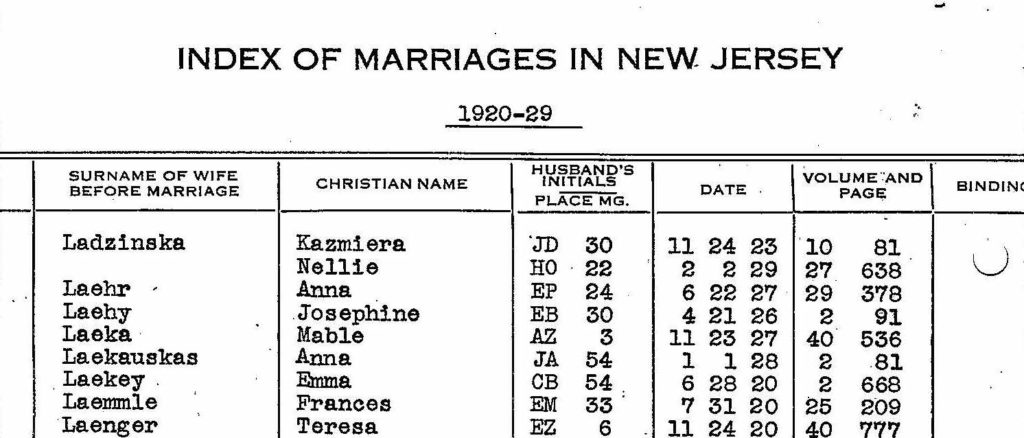
The New Jersey Marriage Index for 1901-2016 is now online for free public use at the Internet Archive. There is a brides index for 1901-2000, a grooms index for some but not all years within 1901-2000, and a combined index that is in roughly chronological order for 2001-2016.
Previously, only a few years of the marriage index were available, 1901-1914, and those were only available thanks to an earlier records request we made to the New Jersey State Archives.
What We Did and How We Did It
Introducing the NEW JERSEY MARRIAGE INDEX, 1901-2016! These records are now totally digital, and totally free — forever! Now you can research anyone who got married in the Garden State right from your home, while still in your pajamas.

We’ve posted these images at our favorite online library, the Internet Archive (archive.org). You can skip right to any year you want and flip through all the images, or you can download the records to your hard drive as JPG’s, PDF’s, and/or other formats. Each file is listed year-by-year (or occasionally by a year range), and then the marriages are listed alphabetically by surname.
Just to be clear: these are images of the index, so this isn’t a real text-searchable marriage database just yet. But rest assured that the usual genealogy websites we all know are going to start indexing projects and will make that happen eventually. (Yes, the Internet Archive does run automatic OCR on the text contained in the images, but the recognition quality isn’t that great, so you’re probably better off just reading through the images instead of trying to text-search.)

Every year from 1901-2000 has a Brides Index, which means that the file is listed alphabetically by the bride’s surname or maiden name. Many (but not all!) years from 1901-2000 also have a Grooms Index, which is alphabetical by the groom’s surname. This means that most years, but not all years, have double coverage. For some reason, all the Brides Index data survived for all years, but the Grooms were not so lucky. Still, once this information eventually gets transcribed into a real database, this discrepancy won’t matter so much because almost every record lists both sets of names.
There are a small number of years in the mid-1930’s where the Grooms Index doesn’t exist anymore and the Brides Index had to be scanned from six microfilm rolls that we had to get from the New Jersey State Archives in Trenton. The awesome people at FamilySearch once again stepped up and graciously volunteered to digitally scan these six microfilms for us for free. Thank you, FamilySearch!
Finally, the 2001-2016 section of the New Jersey marriage index (oooooh, twenty-first century data!) was held in an actual state database, not just a four-generations-removed digitization of a microfilm of a dot-matrix print-out of an old database. We received the records for those years in PDF format, one file per year, but because the state had created those PDF’s by doing a print-to-file directly from their real database, you can do an actual text-search in those 2001-2016 files right now if you download those PDF’s to your computer. That’s good to remember, because these 2001-2016 files are not in any kind of alphabetical order at all, they’re just roughly chronological.

As you can see from the varied example images, these records are in multiple formats, with the data layout changing about once a decade. Some of the records give the exact dates of the marriage, some have the date the license was applied for, some have the month and the year but not the day, and some just have the year. Some of the records give the exact municipality of the marriage, some just give a county, some don’t list any locality at all, and some list a numeric locality code. To make things even more confusing, the state has used at least two different sets of locality codes over the years. Here’s a link to the old list of locality codes that were used between 1949 and 1984, which New Jersey genealogist Michelle Tucker Chubenko was able to dig up for everyone (thanks, Michelle!). And here’s the list with the the modern version of the locality codes, although we’re not 100% sure that this one started in 1985.
One more thing: this record set runs all the way up through 2016. That means that this is the very first public or genealogical marriage database anywhere that includes same-sex couples! We’ve looked around online, and we don’t see any other databases anywhere that include this, not on any website; Ancestry’s Vermont marriage database is probably the one that came closest, but even that one ends a year before their law changed.
In New Jersey, the government started legally recognizing same sex-marriages in September 2013. This means that if you’re using this marriage index for any point after late 2013, the header row that labels people as Bride or Groom is invalid; from that point forward, anybody could be Spouse #1 or Spouse #2, including opposite-sex couples who might have preferred to switch the order on the marriage license paperwork. The state apparently never updated the database field names, and did not add any new columns to record each spouse’s sex.
And one more thing to note about the 2001-2016 portion of the marriage index: that data spans across two pages, not just one. See that layout below?
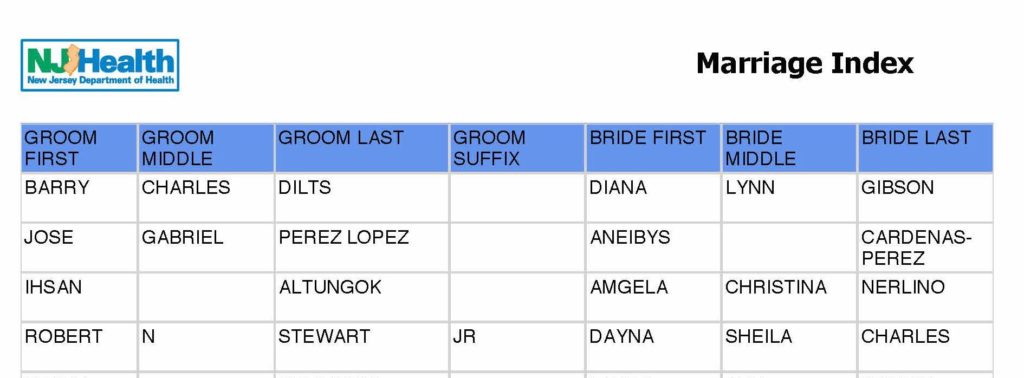
Well that layout is missing four more columns of data, which are on the next page!
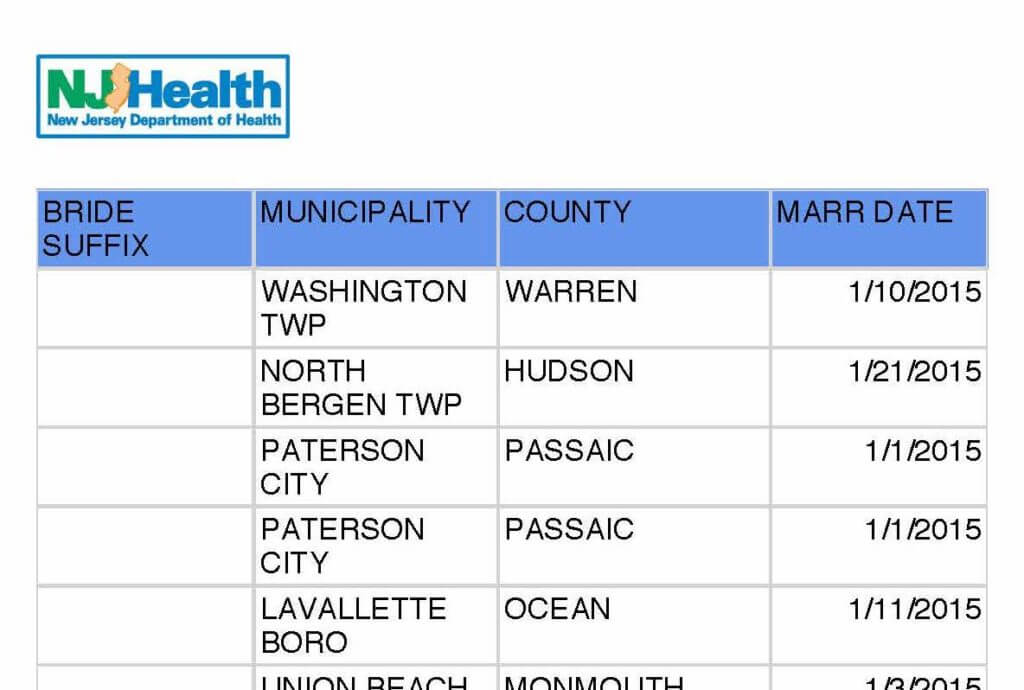
So do be careful to check at least one page ahead, too.
So, how did we get 115 years of New Jersey records? Well, in this case we all owe a huge debt to a mild-mannered genealogist who, probably much like you, was just totally fed up with the government wrongly withholding records from the public. But rather than just being frustrated, he decided to do something about it. This is a story about how one genealogist can make a difference.
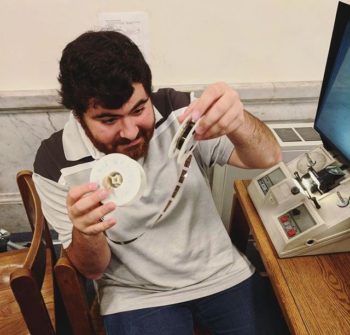
He may look young, but Alec Ferretti been a serious genealogist for more than a decade. Alec is a graduate student at New York University’s Dual Degree Program with LIU, in which he is earning two Masters Degrees simultaneously, one in Archives and Public History, and one in Library Science. He’s a member of the Association of Professional Genealogists (APG) and recently won third place in their Young Professional Scholarship contest. In this photo, we catch a rare glimpse of the genealogist in his native environment amongst the microfilms at the NYC Municipal Archives.
Alec was inspired by our work at Reclaim The Records using Freedom of Information laws to force government archives and agencies to release copies of important archival documents back to the public. In fact, Alec was so inspired that he decided to launch his own public records requests!
He started looking around for states where the birth, marriage, and/or death index — just the basic index, not certificates — were not easily available to the public. Unfortunately, far too many states have some or all of these indices unavailable to researchers. Alec lives in New York, so he had started his search in the northeast and he quickly hit upon the issue of New Jersey’s marriage index.
Alec researched New Jersey’s state law OPRA, the Open Public Records Act, which is their state’s equivalent of New York’s FOIL, the Freedom of Information Law. He then researched New Jersey’s vital records laws, to see what they had to say about birth, marriage, and death records — and their indices. Most states have strict rules about who can access vital records (and when, and how, and how much it will cost per copy), but most states forgot to explicitly restrict the index or finding aid to those same records.
New Jersey is one of those states. Alec realized that while the actual text of the state vital records law seals the marriage certificates as private, it also directs the state to create an index to all marriages, for all counties that have a population more than five thousand people. Well, in New Jersey, every county has a population above five thousand people! And this law further uses the phrase “…which record shall be preserved as a public record” to refer to this index.
In other words, Alec had just figured out that the New Jersey marriage index was always supposed to have been a public record! You can read it for yourself in NJ Rev Stat § 26:8-44 (2013), otherwise known as New Jersey Revised Statutes, Title 26 – Health and Vital Statues: Section 26:8-44 – Indexing, tabulation and preservation of records by State registrar.
So Alec filed an OPRA request with the New Jersey Department of Health on April 26, 2017, asking for a copy of the index. But they denied his request.
So Alec turned to the New Jersey Government Records Council (the GRC) and asked them for an Advisory Opinion about the matter, which is a non-binding but very helpful ruling on some of the facts of the case. But in late May, the GRC told him they couldn’t provide a legal opinion one way or the other because there was essentially no previous case law about this issue for them to go on.
And that’s when Alec realized that he was going to need to bring in the big guns to launch Ferretti v. NJ Dep’t of Health — Office of Population Health, as a Denial of Access Complaint. This would essentially send the case to mediation, which is an option that some other states (including New York) don’t offer. But there was a catch: the backlog of cases meant that it might take up to a year before they heard his case, unless he wanted to file a motion in the New Jersey Supreme Court. Either way he was going to need help, both legally and financially.
And that’s where Reclaim The Records enters the story as something more than just an inspiration. Alec e-mailed us and told us what he’d done so far, and could we maybe help him? Could we set him up with an attorney for either mediation or help him move the case to court?
Well, of course, we said HECK YES we will help you reclaim those records!

So we set up phone calls with Alec, and phone calls with our attorneys. And amongst our Board of Directors we discussed the situation and decided to set aside money and time to fight for these records in mediation and in court, if need be. Alec informed the GRC he would move on to mediation, and the Department of Health agreed. They attempted to set a mediation date for late August or early September, 2017.
On July 11, 2017, the Deputy Attorney General of New Jersey, Angela Juneau-Bezer, took up the case on behalf of the state. This was a little bit intimidating, but we were still prepared to go to court if we had to. Those records were supposed to be open, after all, and we would fight for them. We’d already won the New York City marriage index last year; why shouldn’t New Jersey have an open index too?
But one week later, a small miracle happened. The Deputy Attorney General decided that there was no need to go to mediation after all. She would drop the state’s refusal and the New Jersey marriage index would be legally declared to be available to the public. She would instruct the Department of Health to put all the files on a small hard drive and send it to Alec in the mail, along with an invoice for the cost of the records and the drive. She thought the total costs might be about $675.
Now, that might sound like a lot of money, but really, a one-time charge to get about five million records and 115 years of data released to the public domain forever, plus avoiding all the costs of litigation? That sounded like a very good deal. Reclaim The Records made plans to reimburse Alec for the cost of these records, with his agreement that they would go online for free without any kind of usage restrictions, and we got our credit card ready.
And then? Another small miracle. New Jersey did something very un-Jersey-like and suddenly decided they wouldn’t charge a dime: not for the records, not for the labor, not for the hard drive, and not even for the shipping. They just gave us the data! We’d won everything and in the end it hadn’t cost us a thing — except for time and stress.
Why did they do this? We can only speculate, but it could be that New Jersey realized that they would lose the OPRA case, had we gone to the Supreme Court. New Jersey is one of only a handful of states where a requestor who wins an open records lawsuit will also automatically win payment of all their attorneys fees and court costs. This is unusual; in most other states, including New York, the decision whether to award attorneys fees is a totally separate question from whether the records were being wrongfully withheld from the public.
Alec sent us a copy of the data as soon as he received it. We started to put it all online at the Internet Archive.
And then we realized a few years were missing. The New Jersey Department of Health did not have a complete set of their own state marriage index! They were missing a number of the Grooms Index files for many years, and worse, they were missing the mid-1930’s entirely!
Luckily, we were able to figure out that the New Jersey State Archives in Trenton had copies of the missing years of data on microfilm. Alec reached out to their executive director Joseph Klett, who is himself a dedicated genealogist, and they agreed to make us copies of the six missing microfilms at the low low cost of $35 per film, which was incredibly nice of them. The similarly nice people at FamilySearch then agreed to scan the microfilms for us, and the six missing Brides Index microfilms went online a few months later in December 2017.
We also gave a heads-up e-mail to some friends in the genealogical community about the impending data release. (Special shout-out to all the people in the New Jersey genealogy Facebook groups who knew about this index going online two months ago but who didn’t spill the beans!) All the major websites you would hope or expect to see this data will have it online eventually, and multiple transcription projects are being planned, although it may take a year or two for everything to wind up freely text-searchable.
And as for Alec? Well, he seems to have been bit by the records requesting bug, and we’re working with him on some other new projects that we can’t talk about just yet, in new states. And you should probably tell him thank you for having the great idea to go after these New Jersey records in the first place. (Or you could hire him for your northeastern US genealogy projects, or Italian or Latin American or Jewish genealogy projects, or hire him as an archivist once he finishes his two masters’ degrees…)
One more fun fact: at one point in this records fight, a New Jersey government official casually mentioned to Alec that only a New Jersey state resident could file an OPRA request. This government official was slightly misinformed, as a new court case just this past April decided that OPRA requestors no longer need to prove in-state residency. Nevertheless, Alec was never a New Jersey resident at any point during this fight; he just conveniently didn’t volunteer that fact during the proceedings, and the state officials apparently didn’t think to ask him. We in the genealogical community are the beneficiaries of his forbearance. ?
And there’s one more thing you can do before you rush out and start using the New Jersey marriage index.
We at Reclaim The Records were able to step in and work with Alec on this project because we finally became a real 501(c)(3) registered non-profit earlier this year, and have quietly been fundraising for the past few months. We’re planning to grow and expand, to target records access fights in more states, and to do that we needed to grow up from a little not-for-profit project into a real IRS-approved non-profit organization.
This also meant that we had enough funding to feel comfortable hiring an attorney and potentially launching a new lawsuit to help Alec fight for these records, and we knew we could also pay the state the $675 invoice for the marriage index. It was only by sheer luck that we did not need to pay out either of those associated costs in this particular case, because the state suddenly decided not to go to mediation or to court, and then they didn’t even charge us for the copies of the records.
We want to keep reclaiming and publishing records like this New Jersey marriage index. And we want to keep helping genealogists like Alec with legal assistance and financial support to reclaim any new records they may discover. If another genealogist comes to us tomorrow needing help with another awesome records project, we want to be able to say yes to them too.
So we hope you’ll consider supporting Reclaim The Records so that we can keep on doing things like this.
And we thank you for your support. ?
Paperwork and Court Filings
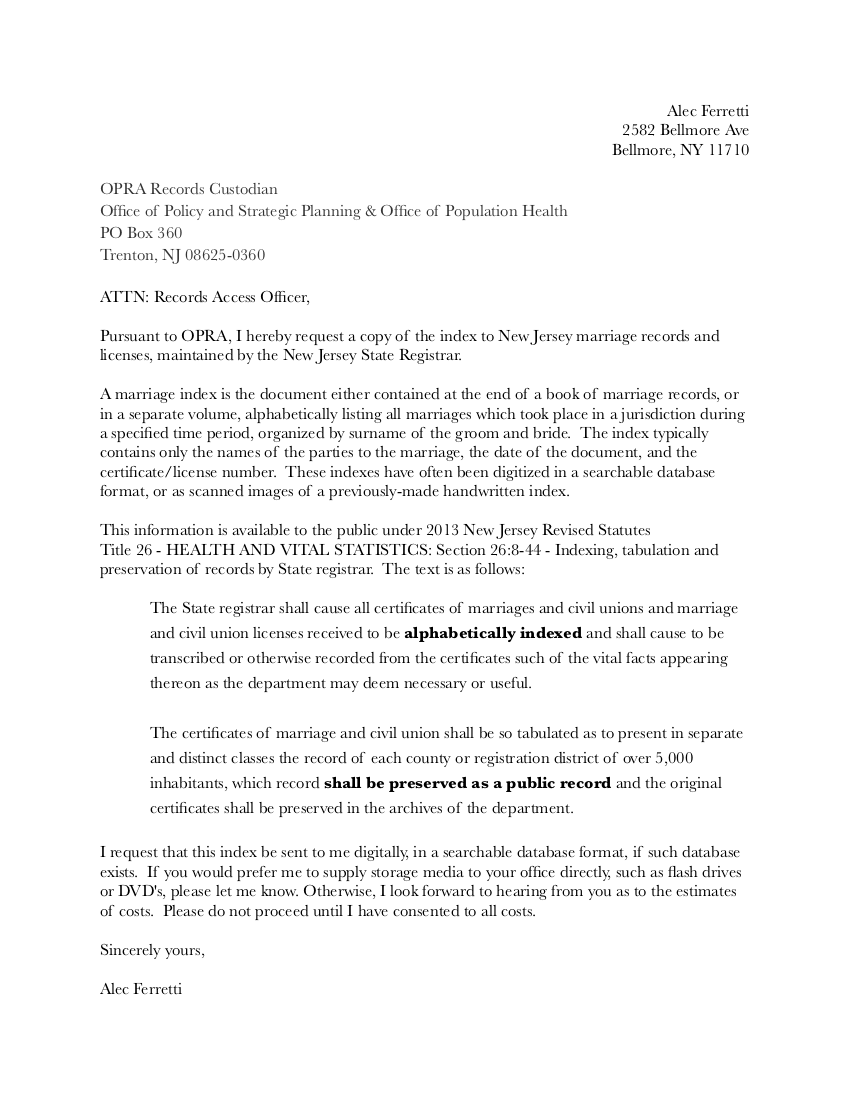
This was the original Open Public Records Act (OPRA) request that Alec made in early 2017.
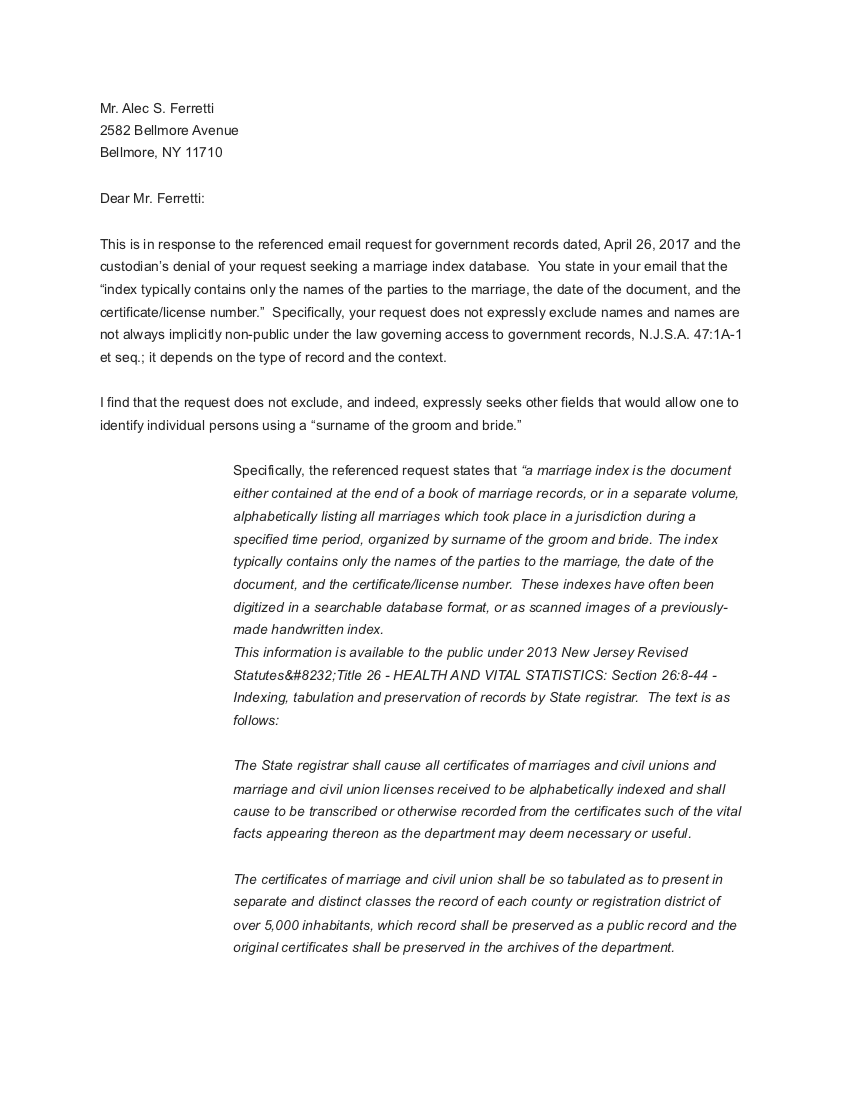
But the New Jersey Department of Health denied his request.
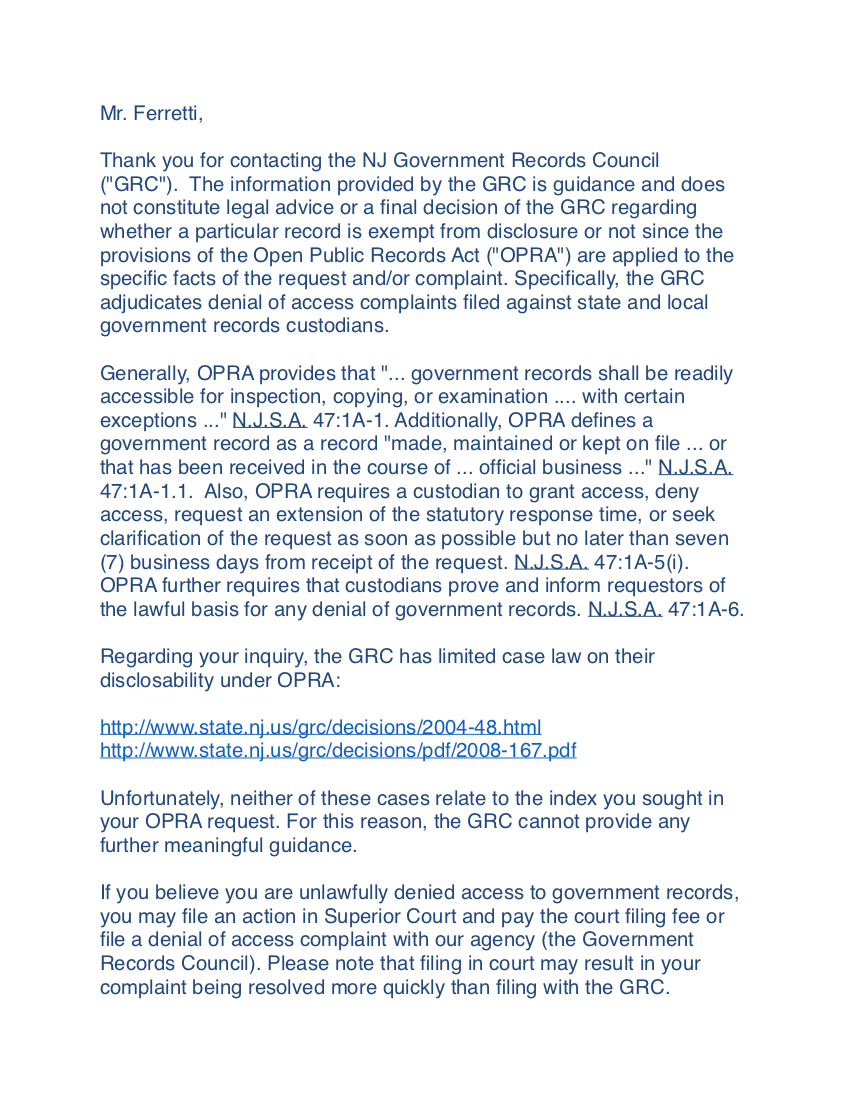
And then the GRC replied that they had no idea how to rule about the case.
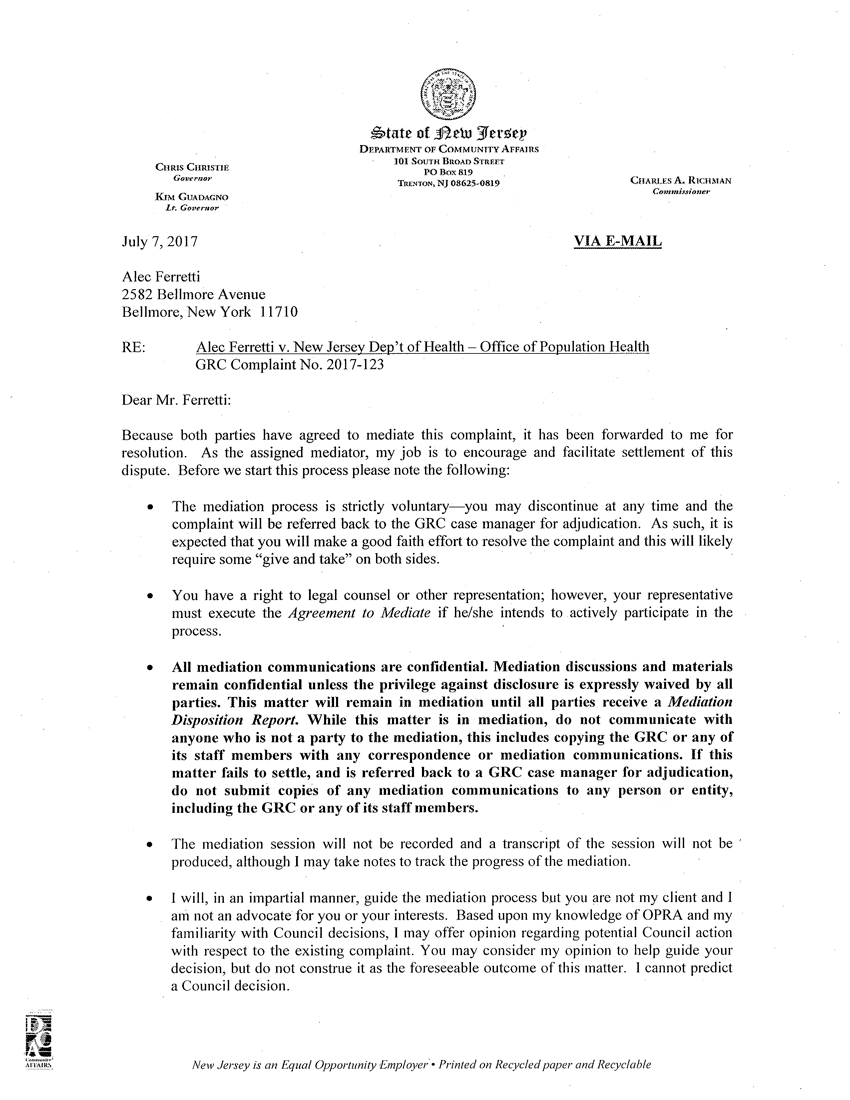
Having been denied, Alec then appealed the OPRA request to the GRC.
Browse the Records
State or Vital Records Jurisdiction: New Jersey
Record Years: 1901-2016
Record Format: Index Only
Record Physical Format: Digital Images
Number of Records (Estimated): approximately five million
Journalists in Massachustts have long used state records to check whether police or public officials have histories of lots of crashes, tickets and OUIs. The state RMV says those records are now closed, citing a clause in the law allowing migrants to obtain driver's licenses.
congratulations to Hachette on their pivotal role in the expansion of book piracy i guess
And another downside is when the vendor who holds the newly-digitized records -- confirmed to be public records by a state ombudsman -- decides they would rather SUE the person requesting copies than comply.
(Vendor: @Ancestry, state: PA, case: ongoing!)
https://twitter.com/opengovva/status/1831316282417062206
There's no newsletter today, but you might want to give this article a read. It's about outsourcing govt record storage. The upside is cost/efficiency. The downside is not being able to search/retrieve records then passing the costs onto record requesters.
Happy (not!) OPRA Gut Bill Day!
You now need to file your #OPRA requests a bit differently. No, you don't have to use the clunky PDF form--you can still send an email. But now you MUST include certain information in the email or it can be denied:
This is a fantastic video lecture that combines so many of our favorite things: FOIA, NARA, computers, and a government agency that first pretended it didn't have the records but then claimed it couldn't access an old format! But with a happy ending!
In which we give a nice interview to Lisa Louise Cooke at @FamilyTreeMag about our work, and some of the crazier reactions to it:
At 11:32 pm eastern time, ICE sent me an email acknowledging a #FOIA request I filed in 2019 that they haven't even started to process yet and asked me that dreaded question: "Are you still interested?"
The FOIA is so effing broken. These agencies will try to wear you down.
Remember this case? Cause we did!
Coming very, very soon, to a certain federal agency that never follows up on their genealogy-related FOIA backlog. 😎
. just as soon as we finish collating several hundred exhibits' worth of proof. 🫢
https://x.com/ReclaimTheRecs/status/1184266391144108033
We've been wrestling with ways to get really important historical and genealogical records out of *states* whose state-level FOI laws often (alas) explicitly exclude the judiciary and their wonderful records (many of which ought to be in archives).
https://x.com/FreeLawProject/status/1815798812742385775
🚨LEGISLATION ALERT: NEW JERSEY ABOUT TO GUT RECORDS ACCESS FOR GENEALOGISTS?🚨(and journalists and historians too, but let’s just focus on the genealogists here for a minute) Hello from your muckraking troublemaking suing-the-government-for-free-genealogical-records friends at Reclaim The Records! We write today with some very frustrating news — but also a chance to save future records access and transparency in the Garden State.The state of New Jersey, where we have successfully acquired and freely released millions of records in recent years, is trying to amend their state-level Freedom of Information law, which they call the Open Public Records Act (OPRA), through bills S2930/A4045. This controversial plan was pulled from the state Appropriations Committee just a few hours ago, but it’s not dead yet by any means, not unless we all work to stop it.This bill to gut the power of the state’s public records law has sparked considerable concern among genealogists, historians, journalists, and champions for government transparency. This call to action provides a detailed explanation of what’s at stake, why it matters, and how we, as a community dedicated to reclaiming and preserving public records, can stand against it.*** Why is New Jersey’s existing law so good for records access? ***Our successful endeavor to unlock the New Jersey Marriage Index (1901-2016) under OPRA serves as a testament to the power of strong public records laws. Back in 2017, when we first tried to get a copy of this data, the New Jersey Department of Health (DOH) refused to release the index, and we prepared to file suit. However, in the end, all we had to do was file a strongly worded appeal with the Government Records Council, because as soon as the Attorney General’s Office got involved, they settled the case with us and produced the records. We promptly posted more than 100 years of New Jersey marriage indexes online, for free, for everyone. Hooray, pork rolls and salt water taffy for everyone!A few months later, we again leveraged this state law, OPRA, to obtain the first-ever New Jersey Death Index for a similar timespan. This time around, the DOH responded promptly to our wonderful open records attorney, CJ Griffin, of Pashman Stein, and the state produced everything they had, again without our actually having to drag them into court, which was a nice change from some of its more cantankerous neighbor states.One of the reasons these two efforts went so relatively smoothly is that unlike many other states’ open records laws, New Jersey’s OPRA mandates that someone who wins a records access lawsuit against the state deserves to have their attorneys fees paid by the state. Because of this, state government agencies are more hesitant to blatantly break the law and wrongly withhold records from the public, because they know they will be on the hook for the fees if they lose the case.But the newly-proposed bill would change that, and make it so that even a totally winning lawsuit against a state agency merely "might" get their attorneys fees reimbursed for their troubles. This would chill the ability of requestors to challenge agencies that wrongly withhold records, because let’s face it, lawsuits are not cheap, and a lot of people would be hesitant or flat-out unable to sue if they knew they wouldn’t get reimbursed for doing the right thing.So we do have a good amount of genealogical material already open from New Jersey, free for everyone, everywhere, forever, and it’s specifically thanks to this law, OPRA. But now the state wants to hobble this awesome public records law in cement shoes and sink it in the Pinelands.*** The Imminent Threats to Genealogical Research ***At the core of the bills lies a series of amendments that not only redefines what constitutes a public record, but also dismantles the mechanisms that hold governmental agencies accountable for denying access without just cause.Our friends (and likely yours) at the Association of Professional Genealogists (the APG) have vocally opposed the proposed revisions, underscoring the dire implications for genealogists and historical researchers. The broadening of "personal identifying information" definitions threatens to severely limit access to essential historical records. These documents, crucial for understanding family origins, could become inaccessible or heavily redacted. The proposed changes could turn professional genealogists, inadvertently caught in the widened net of "data brokers," into unwitting violators of the law, merely for doing their jobs.Moreover, the potential exemption of "draft" documents from public access opens a Pandora’s box of subjectivity, allowing agencies to withhold anything under this ambiguous label. The procedural hurdles introduced by the amendments—such as delaying the start of request processing until "official receipt" by a custodian—pose significant barriers, designed to frustrate and delay the pursuit of information.The draft law goes on to provide for the exemption of metadata from disclosure, which is particularly concerning for genealogists who rely on searchable indexes and comprehensive datasets to conduct thorough historical research. It’s very possible that if this law is signed, the genealogy community will no longer be able to obtain any new vital records indices from New Jersey, as the state may consider an index to be "metadata." That would be a huge and terrible change from our successful efforts in the past few years.*** So, what are we doing about this? ***"Put your makeup on / fix your hair up pretty / and meet me tonight in Atlantic City" — the BossWell of course we’re doing something about this. We don’t know if it’s going to work, but we’re trying. First of all, we’re telling all of you about this situation, so that those of you who live in Jersey can call your legislators and voice your opinions — more on that below. But we’re also doing what we’re traditionally good at doing, which is to say fighting for records (while we still can).Although uncertified copies of vital records (bizarrely called certifications) are generally public in New Jersey, the DOH may try to use the passage of this new gutting-public-records-requests law to derail our request for the indexes. If the law is signed by the governor, we may be never get vital records indexes out of New Jersey ever again.So, earlier this week, we at Reclaim The Records submitted a brand new OPRA request to the New Jersey Department of Health for the state birth index. Yes, the New Jersey birth index, the whole thing. We already have the death index and marriage index, so we may as well complete the set, right? While we were recently able to obtain and release the New Jersey Geographic Birth Index from 1900-1930 from old microfilms at the wonderful and amazing New Jersey State Archives back in 2021, the state DOH still maintains the rest of the birth index, up to the present day.And that’s not the only OPRA request we’re trying to get in under-the-wire, although our other efforts are a little more complicated and going to be kept quiet for now. But in addition to the birth index, we’re also making new OPRA requests that we perhaps would not have considered before, simply to try to beat the clock on the new law. We know that the requests might not work, or might have to become lawsuits, and this bill could become reality at any time. But we have to try.*** And Here’s How You Can Make a Difference ***This moment calls for action from each member of our community, especially those who live in New Jersey. If you are a resident, please reach out to your New Jersey legislators to voice your opposition to any changes to OPRA. Send them an email, and call their offices during business hours. Emphasize the importance of OPRA for genealogical research, historical documentation, and the public’s right to know. Share stories of how access to public records has enriched your life or the lives of others, and stress the negative impact these amendments could have on future research. Explain that the bill’s changes to the state law’s definitions of both "metadata" and "personal identifying information" could severely limit access to historical and genealogical records.And be sure to send a copy of any messages to Governor Murphy as well, and urge him to veto any possible legislation that crosses his desk! His office even has a “Text Governor Murphy” service, reachable at: (732) 605-5455.In the face of these kinds of challenges, your support for Reclaim The Records is more critical than ever. Together, we can continue to fight for transparency, challenge unjust barriers to information, and keep the annals of history open to everyone. As a non-profit organization, we rely on the generosity of our community to continue our advocacy and litigation efforts.The fight against these amendments transcends the interests of genealogists and historians; it is a fight for the soul of open government and democratic accountability. The proposed changes threaten to erect a wall between the public and the information that belongs to it by right, hindering not only our understanding of our past but our ability to scrutinize our present and influence our future.With determination and hope for the future, even in the face of extremely annoying potential law changes…-your friends at Reclaim The Records
… See More See Less